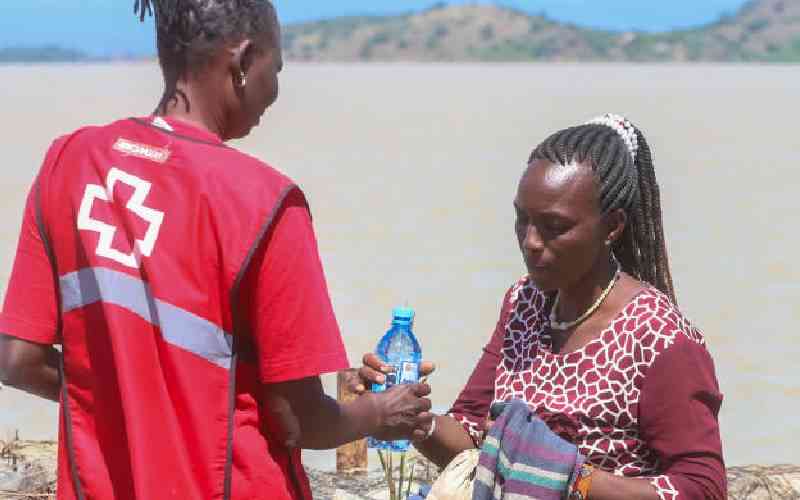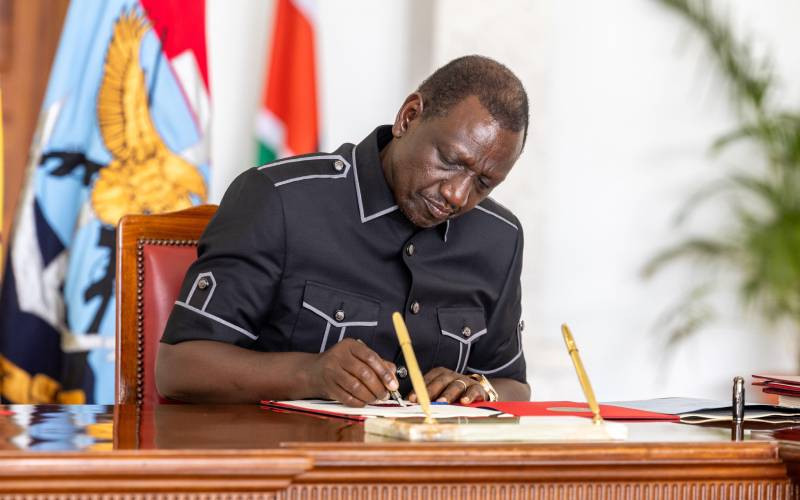Public Watchdog
Last Saturday was a defining moment for the people of South Sudan, who achieved legitimacy as Africa’s youngest independent state after a bloody post-colonial struggle for self-determination. Yes, at the outset, we must in this column offer congratulations and cheers to the new democracy, its people and leadership. Why?
It was a historic moment, not only for the people and new government of South Sudan but all humanity. Many countries including Kenya’s past and present leadership — former President Daniel arap Moi and President Mwai Kibaki, among others — must be acknowledged as having made a difference in the quest for South Sudan’s independence.
Why? The leadership and many technocrats have invested a lot of time and resources in facilitating the struggle for peace and negotiation.
Painful reality
The mood was clearly ecstatic - an effervescence broadcast live across the world and witnessed by tens of thousands of people and invited guests as the new flag was raised and the old lowered signifying declaration of the Independence of South Sudan. The excitement demonstrated hope and a new dawn of exuberance and expectation for the people of South Sudan.
As for its leader and President Salva Kiir and his new government, the occasion marked a new beginning of nation building after years of neglect and a long journey of significant self-sacrifice.
Khartoum’s hitherto de facto leader President Bashir’s statement of support and acknowledgement of the hard and painful reality — that the will of the people of South Sudan must prevail — was an encouraging development in the declaration of independence.
For the new nation, the hard reality must be the enormous task of national reconstruction and nurturing a new social, economic and political spectra. This demands a strong, homegrown determination and substantial support of regional and international community. What, then, are the lessons for the young democracy of South Sudan?
Firstly, the new nation must realise and acknowledge that the task of building a new nation rests mainly on the shoulders of its people who must be offered resolute leadership navigation. The people must be assured that life after independence would not only be better, but also fair and just with opportunity and prosperity for all.
In order to satisfy the element of high expectation, the leadership must immediately engage the people so as to level expectations to realistic levels.
Thus, sensitising and rallying the people in nation- building is as critical as the actual task of building a young democracy. It is also essential to determine a reward programme for all who played a leading role in the struggle, including pension, to prevent a sense of neglect or hopelessness creeping in.
Hopelessness would breed and nurture a bad culture of corruption. Corruption, unless tackled early with strong institutional arrangements, sensitisation and a robust and enforceable system without fear or favour, would create an environment of resentment with potential destabilising impact on institutions and social spectra.
Resist corruption
As a matter of fact, fighting and resisting corruption must be critical lessons that have bedeviled many African democracies. The earlier this is acknowledged and tackled, the better for the new democracy of South Sudan, its people, leadership and government.
Stay informed. Subscribe to our newsletter
Secondly, South Sudan is endowed with substantial natural resources including oil and other minerals that if exploited and utilised appropriately should offer the new nation significant fodder for accelerated development programmes. Thus, an important matter to avoid is making control of these resources the centre of conflict, a situation that has unfortunately destabilised many democracies.
The abundance of resources is certainly part of the reason for regional and international investors’ attraction to the new state.
However, it is incumbent upon its leaders to harness such significant resources towards development of infrastructure to underpin economic growth as a shared national wealth.
Indeed, the new country requires roads, rail transport, airports, schools and health facilities and development of its agricultural potential. Trade and power of exportable resources will serve as necessary fuel for economic growth and improve standards of living of the people.
Thirdly, the political leadership of any country must realise it is acquiescent to the people rather than its master no matter the level of democracy. In this respect, the young democracy should embrace a culture of democratic principle with the right of the people to regularly exercise freedom to elect leaders of their choice. Further, freedom of expression and building of a free media must constitute new pillars of this young democracy.
Media would play a leading role in sensitising and educating the population on available opportunities, point out weaknesses and challenges facing the democracy.
Education, too, must remain an important area of focus given the high level of illiteracy.
Finally, the pace of growth for South Sudan rests on its promotion of trade with her East African neighbours, including the northern neighbour, in order to serve as an indispensable bridge of trade between North, South and East Africa. For this is matter of compelling public interest.
Comments and suggestions to
[email protected]
 The Standard Group Plc is a
multi-media organization with investments in media platforms spanning newspaper
print operations, television, radio broadcasting, digital and online services. The
Standard Group is recognized as a leading multi-media house in Kenya with a key
influence in matters of national and international interest.
The Standard Group Plc is a
multi-media organization with investments in media platforms spanning newspaper
print operations, television, radio broadcasting, digital and online services. The
Standard Group is recognized as a leading multi-media house in Kenya with a key
influence in matters of national and international interest.
 The Standard Group Plc is a
multi-media organization with investments in media platforms spanning newspaper
print operations, television, radio broadcasting, digital and online services. The
Standard Group is recognized as a leading multi-media house in Kenya with a key
influence in matters of national and international interest.
The Standard Group Plc is a
multi-media organization with investments in media platforms spanning newspaper
print operations, television, radio broadcasting, digital and online services. The
Standard Group is recognized as a leading multi-media house in Kenya with a key
influence in matters of national and international interest.








